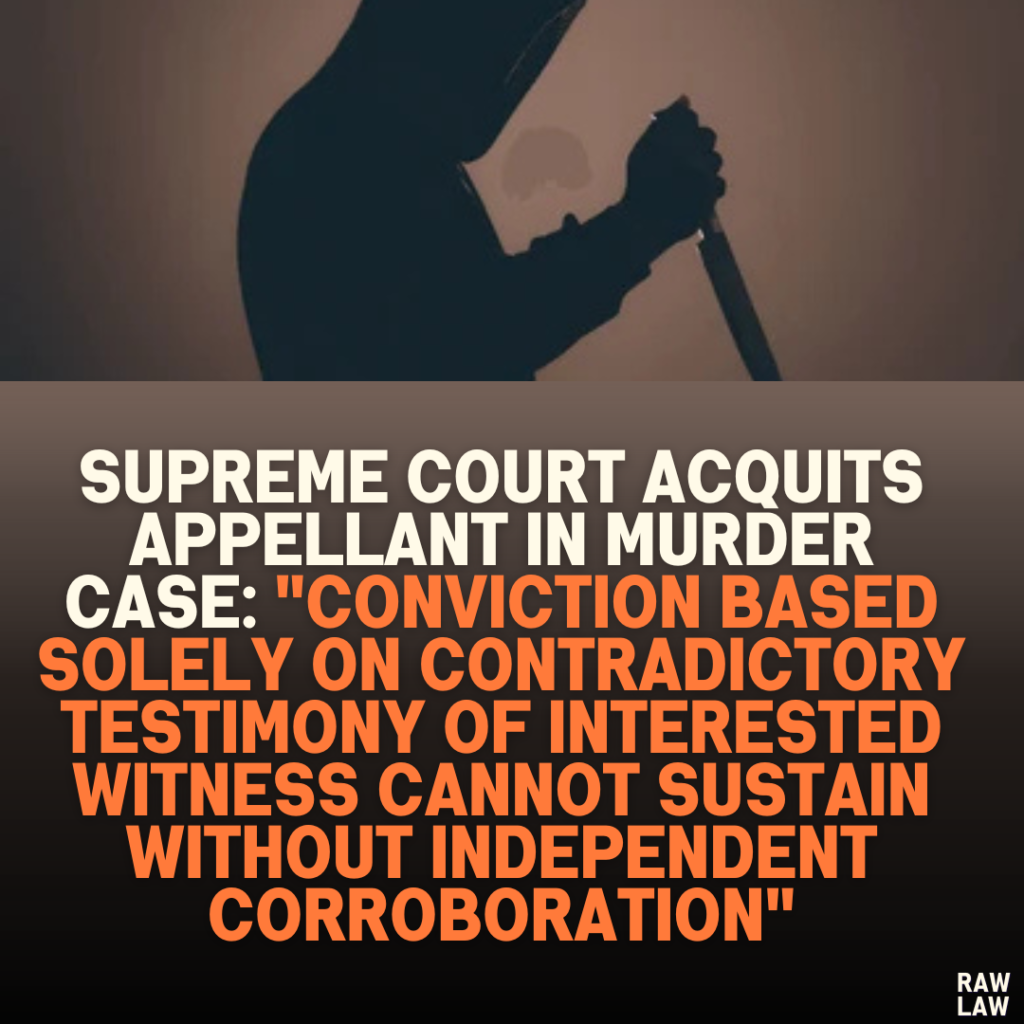Court’s Decision:
The Supreme Court allowed the appeal and quashed the judgment and order passed by the Madurai Bench of the Madras High Court. The High Court’s judgment had convicted the appellant for the crime, but the Supreme Court found the conviction to be flawed due to inconsistencies in the reasoning. The appellant was acquitted of all charges, and the Court directed his immediate release if not required in any other case.
Facts:
The incident that led to the legal proceedings occurred in the early hours of May 16, 2015. The informant (PW-1), who was a Church member and Choir Master at Immanuel Church, reported that his son (the deceased) was fatally attacked by the appellant. The dispute stemmed from an earlier church election in which the informant’s son had supported a candidate opposed by the appellant. On the night of the attack, the informant’s son was standing in front of the Church when the appellant and two other accused came to confront him. They allegedly abused him for participating in the Consecration Festival after opposing their candidate. When the informant’s son responded that they had no right to question him, the appellant took out a knife and chased him. The appellant, along with the two co-accused, allegedly caught the deceased and the appellant fatally stabbed him. The informant’s son was taken to a hospital, where he was declared dead. The informant subsequently filed an FIR. Based on the investigation and evidence, the appellant was convicted of several offenses, including murder (Section 302 IPC).
Issues:
The main legal questions raised in this case were:
- Validity of Conviction: Whether a conviction can be based solely on the testimony of an interested witness, particularly when that same testimony led to the acquittal of two other co-accused.
- Inconsistent Findings: Whether it was correct for the High Court to convict the appellant based on the same evidence that it disbelieved concerning the other two accused.
Petitioner’s Arguments:
The appellant’s counsel argued that the High Court had erred by convicting the appellant based on the testimony of the informant, PW-1. The appellant’s counsel highlighted the inconsistency in the High Court’s decision: the same testimony of PW-1 was disbelieved with regard to the two co-accused, who were acquitted, yet this same evidence was accepted to convict the appellant. This inconsistency was central to the appellant’s argument that the conviction should be overturned.
Respondent’s Arguments:
The counsel representing the State argued that the conviction should be upheld because the findings of fact by the trial court and the High Court were concurrent. The respondent contended that the evidence, although based on the testimony of a single witness, was sufficient to sustain the conviction and that no interference by the Supreme Court was warranted.
Analysis of the Law:
The Court reflected on the principle of law that a conviction can be based on the testimony of a sole witness, but that witness’s credibility must be carefully examined. In this case, the testimony of PW-1, the informant and father of the deceased, was key. However, since PW-1 was an interested witness, his testimony required greater scrutiny. The Court emphasized that the High Court’s decision to acquit the two co-accused based on the same testimony, while convicting the appellant, was flawed. The Court found that it was not permissible to rely on this testimony to convict the appellant when the same evidence was not sufficient to convict the co-accused.
Precedent Analysis:
The Court considered precedents on the admissibility of a sole witness’s testimony. It was noted that while Indian criminal jurisprudence allows a conviction based on the sole testimony of a witness, the circumstances surrounding the testimony must be clear and beyond doubt. The testimony must not be inherently contradictory or unreliable. The Court also pointed out that the High Court had failed to apply this principle consistently in its judgment.
Court’s Reasoning:
The Supreme Court pointed out that while the conviction could technically rest on the sole testimony of PW-1, the High Court had failed to maintain consistency in its assessment of the witness. The High Court disbelieved PW-1’s testimony in relation to the co-accused, but based the conviction of the appellant entirely on the same witness’s testimony, which was inconsistent. Additionally, the Court highlighted that the High Court’s finding was based on conjectures and surmises, as there was no solid proof beyond PW-1’s statement to support the appellant’s conviction. Furthermore, the Court observed that the appellant’s conviction was also based on the recovery of the weapon (knife), but the recovery was made from an open area, which did not make it a conclusive piece of evidence against the appellant.
Conclusion:
The Supreme Court concluded that the High Court’s decision was not based on sound reasoning. The conviction of the appellant, relying solely on the testimony of an interested witness (PW-1), was found to be unjustifiable. The inconsistencies in the High Court’s findings and its reliance on conjecture led the Court to overturn the conviction. The appeal was allowed, the appellant was acquitted of all charges, and the High Court’s judgment was set aside.
Implications:
This case underscores the importance of consistency in legal findings, especially when multiple accused are involved in a crime. It highlights that convictions based on the testimony of an interested witness, particularly a family member, must be scrutinized with greater caution. It also sets a precedent that when such testimony is disbelieved for some accused, it cannot be relied upon to convict another accused in the same incident unless supported by additional, independent evidence. The ruling serves as a reminder that criminal convictions must be based on clear, consistent, and reliable evidence, and any reasonable doubt should favor the accused.



